▼ Shahid Khaqan Abbasi is Pak's new interim PM [07-31-17]
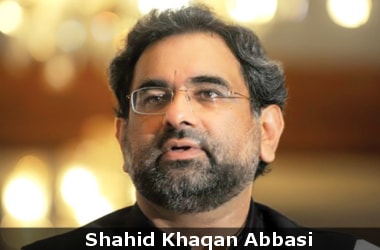 Senior PML-N leader and former petroleum minister Shahid Khaqan Abbasi will run the PML-N government as interim prime minister of Pakistan. Senior PML-N leader and former petroleum minister Shahid Khaqan Abbasi will run the PML-N government as interim prime minister of Pakistan.
This is until Nawaz Sharif's brother Shahbaz is elected as member of parliament, according to Pakistan media reports.
The Supreme Court Friday disqualified 67-year-old Sharif for dishonesty and ruled that corruption cases be filed against him and his children over the Panama Papers scandal.
The investigation was instrumental in forcing the embattled leader out of office.
Pakistan Muslim League-Nawaz (PML-N) has decided to appoint Shahbaz Sharif as prime minister in an informal meeting.
Former petroleum minister Abbasi will be appointed as interim prime minister to run the country until Shahbaz is elected as member of parliament.
The final announcement will be made by Nawaz Sharif in the formal parliamentary party meeting of PML-N which is taking place in Islamabad a day after he was disqualified by the Supreme Court.
Party sources had earlier said that Sharif proposed the name of his younger brother Shahbaz.
But Shahbaz, 65, cannot immediately replace his brother as he is not an MP. In order to become the prime minister, he would have to be elected first.
Hence, Abbasi has been named as interim prime minister who will resign once Shahbaz is elected.
Pakistan has seen such arrangements in the past too. During former military dictator General Pervez Musharraf’s time, politician Chaudhry Shujaat Hussain was appointed as an interim prime minister until Shaukat Aziz, who was nominated by Musharraf, got elected by the ruling Pakistan Muslim League Quaid-e-Azam (PMLQ).
Shahbaz Sharif is the son of late Mian Muhammad Sharif and brother of Nawaz Sharif.
Currently, Shahbaz is the chief minister of Pakistan's most populous province, Punjab.
He began his political career as a member of the Punjab Assembly in 1988.
Thereafter, Shahbaz became the opposition leader of Punjab Assembly in 1993.
Earlier, from 1997 to 1999, Shehbaz had held the position of Punjab chief minister.
However, he spent years of self-exile in Saudi Arabia, before returning to Pakistan in 2007.
Along with Shahbaz Sharif, Khawaja Asif, Sardar Ayaz Sadiq, Ahsan Iqbal, and Chaudhry Nisar Ali Khan were also in contention to replace Nawaz Sharif.
Nawaz Sharif's decision to step down brought an unceremonious end to his term in power, roughly a year before the scheduled General Election.
Had Nawaz Sharif stayed in power till the scheduled elections, he would have become the first Prime Minister of Pakistan to complete a full five-year term.
|
▼ Japanese defence minister Tomomi Inada quits [07-28-17]
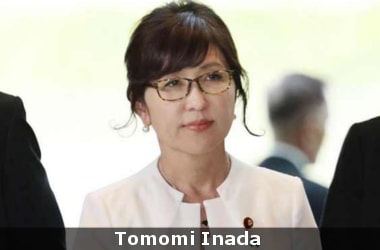 Embattled Japanese Defence Minister Tomomi Inada on 28th July 2017 announced resigning, after a series of gaffes, missteps and a cover-up at her ministry that have contributed to a sharp plunge in public support for Prime Minister Shinzo Abe. Embattled Japanese Defence Minister Tomomi Inada on 28th July 2017 announced resigning, after a series of gaffes, missteps and a cover-up at her ministry that have contributed to a sharp plunge in public support for Prime Minister Shinzo Abe.
Ms. Inada (58), an Abe protege who shares his conservative views, had already expected to be replaced in a likely cabinet reshuffle next week that Mr. Abe hopes will help repair his ratings.
Support for the Prime Minister has sunk below 30 per cent in some polls, due to scandals over suspected cronyism and a view among many voters that he and his aides took them for granted.
Foreign Minister Fumio Kishida would add the defence portfolio to his duties, to eliminate any gap at a time when Japan faces tough security challenges, such as volatile North Korea.
The resignation coincided with a report of an investigation into suspicions that defence ministry officials tried to hide logs showing worsening security in South Sudan.
This is where Japanese troops joined in a U.S.-led peacekeeping operation.
Troop deployment in the dangerous environment violated conditions set for such activities in line with Japan's pacifist constitution.
No Japanese troops have died in combat since World War Two and the growing chaos in South Sudan fuelled concern.
Mr. Abe, who returned to power in December 2012 promising to revive the economy and bolster defence, had until recently been seen as likely to win a third term when his tenure ends in September 2018, putting him on track to be Japan's longest-serving prime minister.
But the ratings plunge is making it more likely that LDP rivals will challenge him for the top party post - and the premiership.
The main opposition Democratic Party, however, has failed to capitalise on Mr. Abe's troubles.
|
▼ Meet USS Gerald Ford - Largest aircraft carrier by America [07-25-17]
 With praise and a blessing for the military, President Donald Trump helped hand over the USS Gerald Ford to the Navy on 22nd July 2017. With praise and a blessing for the military, President Donald Trump helped hand over the USS Gerald Ford to the Navy on 22nd July 2017.
American steel and American hands have constructed this 100,000-ton message to the world.
Susan Ford Bales is the ship’s sponsor and daughter of the 38th president, whom the ship honours.
Some of the USS Ford’s state-of-the-art systems and technology costs hundreds of millions of dollars.
Construction started in 2009 and was to be completed by September 2015 at a cost of $10.5 billion.
The Navy has blamed the delays and budget overruns on the ship’s advanced systems and technology, including electromagnetic launch systems for jets and drones that will replace steam catapults.
The warship also has a smaller island that sits farther back on the ship to make it quicker to refuel, re-arm and relaunch planes, and a nuclear power plant designed to allow cruising speeds of more than 30 knots and operation for 20 years without refuelling.
The vessel completed sea trials in April but still will go through a battery of tests and workups at sea before becoming ready for deployment, work that is expected to cost nearly $780 million and take more than four years to complete.
Docked at Naval Station Norfolk, the USS Ford eventually will house about 2,600 sailors, 600 fewer than the previous generation of aircraft carriers. The Navy says that will save more than $4 billion over the ship’s 50-year lifespan.
The air wing to support the Ford could add more personnel to the ship, which is designed to house more than 4,600 crew members.
The Ford was built at Newport News Shipbuilding, a giant Navy contractor in Virginia.
|
▼ UK Supreme Court gets its first female president Brenda Hale [07-24-17]
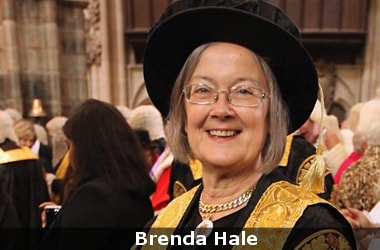 The UK Supreme Court on 21st July appointed its first female president, Brenda Hale, making her the first woman to be the most senior judge in the country. The UK Supreme Court on 21st July appointed its first female president, Brenda Hale, making her the first woman to be the most senior judge in the country.
Hale, an expert in family law who has been the court’s deputy president since June 2013, will succeed Lord David Neuberger as its head in October, following his retirement.
Hale said it was a "great honour and a challenge" to follow Neuberger.
In 1984, she was the first woman to be appointed to the Law Commission, and 20 years later she became the UK's first Law Lord. In 2009, she became the first woman to sit on the newly formed Supreme Court.
Neuberger welcomed her appointment as his successor.
Rights Info, a digital human rights campaign group, celebrated Hale as a prominent champion of diversity in the judiciary and supporter of human rights protections.
Hale's promotion was announced at the same time as Lady Justice Jill Black was named as only the second woman to sit on the UK Supreme Court.
She and two other new justices, Lord Justice David Lloyd Jones and Lord Justice Michael Briggs, will join the court on October 2, when Hale will also be formally sworn in.
|
▼ French military head resigns over defence spending cuts [07-20-17]
 French leader Emmanuel Macron faced the biggest crisis of his young presidency on Wednesday following the resignation of the head of the armed forces. French leader Emmanuel Macron faced the biggest crisis of his young presidency on Wednesday following the resignation of the head of the armed forces.
Macron had rebuked him for criticising defence spending cuts.
The row between Mr. Macron and General Pierre De Villiers blew up last week when the chief of staff told a parliamentary committee that he would not allow the armed forces to be harmed by the government’s plans to slash 850 million euros from this year’s budget.
Mr. Macron, 39, slapped down the 60-year-old, five-star General, telling the army top brass at their annual summer party “I am the boss” and that he deeply regretted that the budget dispute had been dragged into the “public sphere.”
General De Villiers, who had been in the job for three years, said he felt he had no choice but to stand down.
“I no longer feel able to ensure the sustainability of the model of the armed forces that I think is necessary to guarantee the protection of France and the French people,” he said in a statement.
Mr. Macron named 55-year-old General Francois Lecointre, currently the top military adviser to the Prime Minister, as his replacement.
At a weekly Cabinet meeting, the President hailed General de Villiers for his “remarkable service” and promised to hike the defence budget again in 2018, government spokesman Christophe Castaner said.
|
▼ Gopal Prasad Parajuli is Nepal’s new CJ [07-19-17]
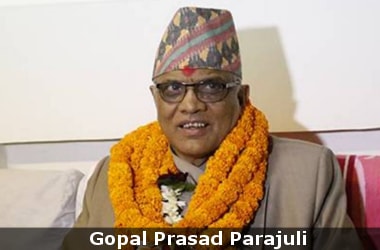 The name of acting Chief Justice Gopal Prasad Parajuli was unanimously endorsed on July 16 by the Parliamentary Hearing Special Committee (PHSC) for the post of Nepal's Supreme Court Chief Justice. Parajuli was summoned by the PHSC at its meeting today to conduct the hearing. The name of acting Chief Justice Gopal Prasad Parajuli was unanimously endorsed on July 16 by the Parliamentary Hearing Special Committee (PHSC) for the post of Nepal's Supreme Court Chief Justice. Parajuli was summoned by the PHSC at its meeting today to conduct the hearing.
Nepal’s President Bidhya Devi Bhandari appointed him to the post, which he will continue to head till April 28 next year.
A 39-point judiciary reform plan was presented by Parajuli during the meeting.
Parajuli’s name was sent to the PHSC for hearing by the Constitutional Council on June 29. P
Parajuli, the senior-most Justice at the Supreme Court, has taken up the responsibility of acting Chief Justice since June 7, this year after the retirement of then Chief Justice Sushila Karki on June 6.
After being sworn in as Nepal’s new chief justice has pledged to make justice delivery fast and less expensive in the country.
Parajuli, 61, was administered the oath of office by President Bidya Devi Bhandari at Rastrapati Bhawan in Sheetal Niwas.
He had taken charge of the Supreme Court as the acting chief justice on June 7 when Sushila Karki, the first female chief justice of the country, retired.
|
▼ British gets first Sikh lady MP on Parliament Committee [07-19-17]
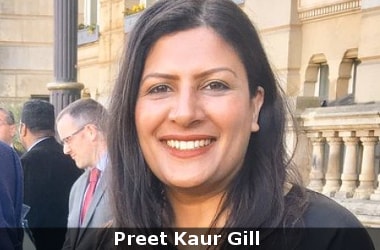 Britain’s first woman Sikh MP Preet Kaur Gill was elected to Home Affairs Select Committee in the UK Parliament. Britain’s first woman Sikh MP Preet Kaur Gill was elected to Home Affairs Select Committee in the UK Parliament.
She will be one of 11 MPs on the cross-party home affairs committee.
The Home Affairs Select Committee is an influential cross-party panel in the UK Parliament that examines the workings of the Home Office.
It investigates the spending, policy and administration of the ministerial department. The committee chooses its own subjects of inquiry within the remit of the home office.
Previous inquiries have looked at extremism, immigration, hate crime, asylum, drugs, human trafficking, prostitution, extradition, counter-terrorism and the police.
It publishes reports and the Government must respond to its recommendations.
Labour party MP Yvette Cooper was recently elected unopposed as chairman of the committee.
Earlier it was chaired by Keith Vaz, Britain’s longest-serving Indian-origin MP, who had stepped down in September 2016.
Preet Kaur Gill had won the Edgbaston seat for the Labour party in the June 2017 snap general election.
She also has been chosen to lead the All Party Parliamentary Group (APPG) for British Sikhs, which promotes the interests of Sikhs in Britain.
Gill’s whose family is from Jamsher, in Jalandhar, Punjab.
Her father, Daljit Singh, had moved and settled in the UK in 1962.
|
▼ Former Brazilian president indicted on corruption charges [07-13-17]
 Former Brazilian President Luiz Inacio Lula da Silva was found guilty of corruption and money laundering on July 12, 2017 and sentenced to almost 10 years in prison. Former Brazilian President Luiz Inacio Lula da Silva was found guilty of corruption and money laundering on July 12, 2017 and sentenced to almost 10 years in prison.
This is the highest-profile conviction yet in the sprawling graft investigation that has jailed dozens of Brazil’s elite.
The decision by Judge Sergio Moro was widely expected, even by Silva’s own defense team, but was still stunning.
The charismatic leader left office on Dec. 31, 2010, with sky-high popularity and is credited with pulling millions of Brazilians out of poverty and turning Latin America’s largest nation into an important player on the world stage.
Brazil’s first working class president will remain free while an appeal is heard, but he is now also the country’s first ex-president to be convicted in a criminal proceeding at least since democracy was restored in the 1980s.
In many quarters, the man known to Brazilians simply as Lula remains revered both for his economic policies and his role in fighting for democracy during the country’s dictatorship.
The 71-year-old has been considered a front-runner for next year’s presidential election.
The case is part of the huge “Operation Car Wash” corruption investigation centred on state-run oil giant Petrobras that has led to the convictions of dozens of business executives and politicians, and threatens current President Michel Temer.
Silva was accused of receiving a beachfront apartment and repairs to the property as kickbacks from construction company OAS.
Silva never owned the apartment, but prosecutors argued it was intended for him.
Prosecutors also alleged that OAS paid to store Silva’s belongings, but Judge Moro dismissed that part of the case.
Silva also faces charges in four other cases.
Judge Moro said he did not order Silva’s immediate arrest because the conviction of a president is such a serious matter that he felt the former leader’s appeal should be heard first.
The case now goes before a group of magistrates. If they uphold the conviction, Brazilian law says Silva would be barred from seeking office.
In addition to sentencing Silva to 9 1/2 years in prison, Judge Moro also ruled that the politician should be barred from public office for 19 years.
Silva’s presidency coincided with an economic boom fuelled by high commodity prices and he used the profits to fund generous social programs that made him a hero among Brazil’s poor.
He left office with popularity ratings of up to 87 per cent and Brazilians elected his hand-picked successor, Dilma Rousseff, to succeed him.
But a subsequent fall in commodity prices and economic mismanagement by Silva and Ms. Rousseff led Brazil’s economy to implode.
|
▼ French PM Edouard Philippe wins confidence vote by landslide margin [07-7-17]
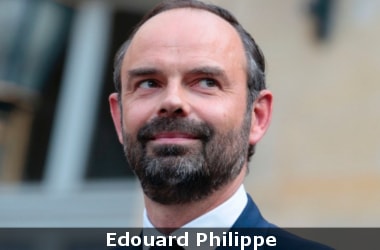 French Prime Minister Edouard Philippe overwhelmingly won the confidence vote in the National Assembly on 4 July 2017. French Prime Minister Edouard Philippe overwhelmingly won the confidence vote in the National Assembly on 4 July 2017.
Philippe won the vote in France’s lower house of parliament by a huge margin, 370-67.
He not only had the backing of President Emmanuel Macron’s party that has a wide majority after a landslide victory last month but he also got votes from centrist allies and some even from the conservative lawmakers.
The country’s national audit office reported last week that France’s budget deficit could reach 3.2 percent above the EU limit for the 10th consecutive year in 2017 if no measures are taken.
To resolve the same, Philippe pledged to bring the country’s budget deficit under the European Union limit of 3 percent this year without raising taxes.
He further pledged to stop increasing the number of state employees and to make the government focus on its main priorities and to stop spending money on policies that don’t deliver results.
The French PM also detailed the government’s agenda in the next months and years, from health to education and job policies.
He notably wants to raise the price of a cigarette pack from current 7 euros ($8) to 10 euros ($11.35).
He has also promised to push for labour reform that aims to boost job creation, as unemployment in France has been hanging around 10 percent for years.
Coping with Migrant Crisis: France's Challenge
- Besides this, the French government will soon be outlining new measures to handle Europe’s migrant crisis.
- It is seeking a balance between helping refugees and controlling illegal immigration.
- The government also wants to reduce the asylum application procedure from 14 months now to 6 months and be able to deport those who are not granted asylum.
- In an effort to fight rising terrorism, the country’s military budget next year will increase spending on defence to 2 percent of GDP by 2025.
- Further, Edouard Philippe said that by choosing to vote for Macron, French voters have showed that they are attached to the European Union and the euro.
- They want a more concrete, less fussy and more protective Europe.
- Macron’s leading competitor Marine Le Pen, who lost her presidential bid to him, on the other hand, said that his economic plans would produce very tough consequences to buying power for French citizens.
|